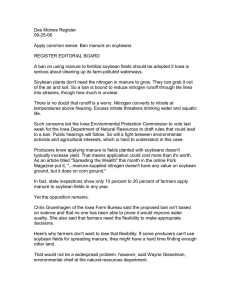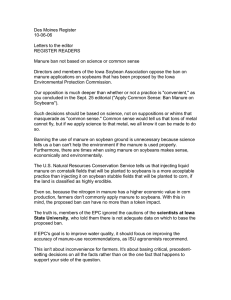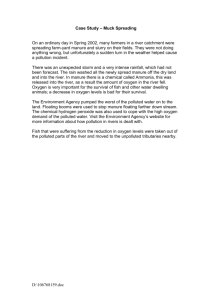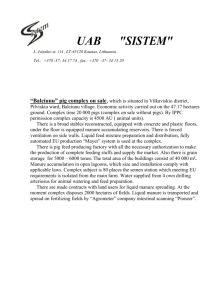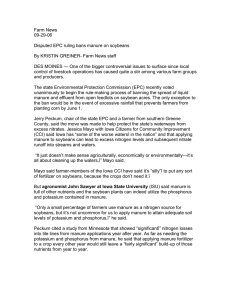Des Moines Register 05-16-06 Panel: Ban liquid manure on beans
advertisement
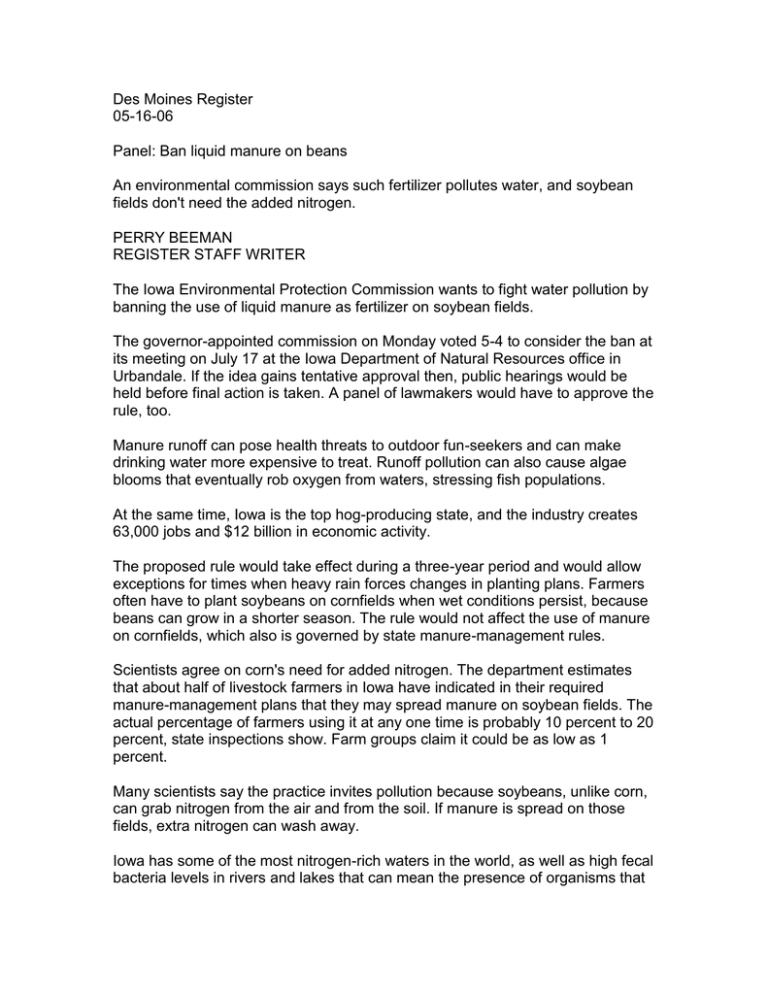
Des Moines Register 05-16-06 Panel: Ban liquid manure on beans An environmental commission says such fertilizer pollutes water, and soybean fields don't need the added nitrogen. PERRY BEEMAN REGISTER STAFF WRITER The Iowa Environmental Protection Commission wants to fight water pollution by banning the use of liquid manure as fertilizer on soybean fields. The governor-appointed commission on Monday voted 5-4 to consider the ban at its meeting on July 17 at the Iowa Department of Natural Resources office in Urbandale. If the idea gains tentative approval then, public hearings would be held before final action is taken. A panel of lawmakers would have to approve the rule, too. Manure runoff can pose health threats to outdoor fun-seekers and can make drinking water more expensive to treat. Runoff pollution can also cause algae blooms that eventually rob oxygen from waters, stressing fish populations. At the same time, Iowa is the top hog-producing state, and the industry creates 63,000 jobs and $12 billion in economic activity. The proposed rule would take effect during a three-year period and would allow exceptions for times when heavy rain forces changes in planting plans. Farmers often have to plant soybeans on cornfields when wet conditions persist, because beans can grow in a shorter season. The rule would not affect the use of manure on cornfields, which also is governed by state manure-management rules. Scientists agree on corn's need for added nitrogen. The department estimates that about half of livestock farmers in Iowa have indicated in their required manure-management plans that they may spread manure on soybean fields. The actual percentage of farmers using it at any one time is probably 10 percent to 20 percent, state inspections show. Farm groups claim it could be as low as 1 percent. Many scientists say the practice invites pollution because soybeans, unlike corn, can grab nitrogen from the air and from the soil. If manure is spread on those fields, extra nitrogen can wash away. Iowa has some of the most nitrogen-rich waters in the world, as well as high fecal bacteria levels in rivers and lakes that can mean the presence of organisms that can make people sick. Wayne Gieselman, the state's environmental protection chief, said the department proposed the restriction because many scientists say fertilizing soybeans is bad for the environment. Gieselman, a farmer for 20 years, said few farmers would choose to buy commercial fertilizer for soybean fields, especially at prices ballooned by high natural gas costs, knowing the plants would do fine without it. "No farmer in his right mind would buy nitrogen for soybeans," Gieselman said. They apply the manure because it's free fertilizer and they need to get rid of it. Spreading it around Iowa requires livestock farmers running larger operations to prove they have enough land on which to spread manure in ways that won't lead to pollution. This change would mean farmers would have to find more fields for manure application. Kevin Westaby of Alexander, whose KGL Enterprises Ltd. applies manure on farm fields, said farmers in his area have reported better yields with manure applications to soybean fields. Researchers at Iowa State University, the University of Nebraska-Lincoln and elsewhere have reported little benefit and have found evidence that some nitrogen in the manure washes into waterways. Westaby said the rule could hurt farmers by forcing many to grow only corn at a time when the emergence of biodiesel means more demand for soybeans. Rick Robinson of the Iowa Farm Bureau Federation said evidence of environmental problems has been scarce. New ISU research contending there may be pollution problems associated with the practice still needs to be reviewed and published, and the state should wait for that before action, Robinson said. Commissioner Donna Buell of Spirit Lake said the debate seems simple. "I haven't come across an issue that is such common knowledge," Buell said, supporting the rule. "You don't put nitrogen on soybeans." Farm groups oppose rule Dissenting commissioners favored asking a work group to study the issue for months, maybe years, to see whether such a rule was needed. Commissioners Darrell Hanson of Manchester, David Petty of Eldora, Henry Marquard of Muscatine and Mary Gail Scott of Cedar Rapids opposed the proposed rule. Major farm groups - including the Iowa Pork Producers Association, the Iowa Commercial Nutrient Applicators Association, the Iowa Farm Bureau Federation and the major grain organizations — also opposed the restriction. "Iowa farmers are very discerning when making cost-benefit decisions for crop production," said Ken Rozenboom, applicators association president. "Typically, that means manure is applied to ground that will be planted to corn because corn will benefit most from the nitrogen content of the manure. However, there are times and places where it makes sense to apply fertilizer or manure to soybeans." That's especially the case on soils low in phosphorus or nitrogen, he said, citing university research backing his view. Commissioner Francis Thicke noted that some research backing the practice was financed by commodity groups. Several environmental groups, including the Sierra Club and Iowa Citizens for Community Improvement, support the rule as a way to help cut pollution.
